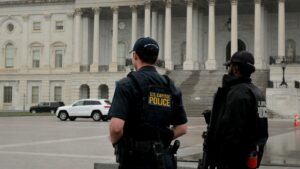Supreme Court Challenges Trump’s Immigration Strategy
This week has seen significant legal confrontations between the Trump administration and the courts over immigration policies, with a potential Supreme Court confrontation on the horizon.
Miles Parks, NPR Host:
In his aggressive push to fulfill immigration promises, including mass deportations, President Donald Trump’s administration finds itself embroiled in a series of legal battles, some reaching the Supreme Court. NPR’s Ximena Bustillo provides insights.
Ximena Bustillo, NPR Immigration Policy Reporter:
The Supreme Court recently issued a late-night order, blocking the use of the Alien Enemies Act for deportations from the Bluebonnet Detention Facility in Texas. This decision saw dissent from Justices Clarence Thomas and Samuel Alito.
The American Civil Liberties Union (ACLU) had identified issues with the facility, where detainees received forms indicating imminent deportation under the Act, without due process or means to contest. Despite a previous ruling allowing the Act’s use, the Supreme Court had mandated due process, which the ACLU claims was absent here. Their appeal followed Judge James Boasberg’s refusal to intervene, citing jurisdiction limitations.
The Alien Enemies Act, a wartime measure, allows expedited deportations bypassing conventional immigration courts. Historically invoked in wartime, its use by Trump is to hasten deportations, as immigration court proceedings are lengthy. The ACLU argues against its current application, citing a lack of due process compared to past usages when hearings were provided.
With the Supreme Court currently permitting the Act’s use, pending individual legal challenges, various district courts have restricted its application, influencing the administration’s strategy regarding detention centers like Bluebonnet.
There has been no immediate response from the White House to the Supreme Court’s ruling. However, a Homeland Security spokesperson stated compliance with court orders. Trump has posted on Truth Social, highlighting deportations to CECOT, El Salvador’s infamous megaprison.
El Salvador has become a pivotal partner in the administration’s deportation efforts. Despite judicial and Supreme Court hurdles slowing the Alien Enemies Act’s use, deportations to CECOT continue, supported by Trump and Salvadoran President Nayib Bukele’s growing alliance, with plans to expand the facility.
Overall, the administration’s immigration policies face a mixed reception in courts. While some initiatives advance, others face legal challenges or remain unresolved. A notable case involves the Day 1 executive order on birthright citizenship, with Supreme Court hearings scheduled. Temporary restraining orders have also paused efforts to revoke parole status for many immigrants.
Despite setbacks, the administration has seen progress, such as provisional approval to use the Alien Enemies Act and mandates for undocumented individuals to register with the government, continuing to shape the policy landscape.
Miles Parks: Thank you, Ximena Bustillo, for your detailed coverage of these developments.
Ximena Bustillo: My pleasure. Thanks for having me.
Accuracy and availability of NPR transcripts may vary. Transcript text may be revised to correct errors or match updates to audio. Audio on npr.org may be edited after its original broadcast or publication. The authoritative record of NPR’s programming is the audio record.






